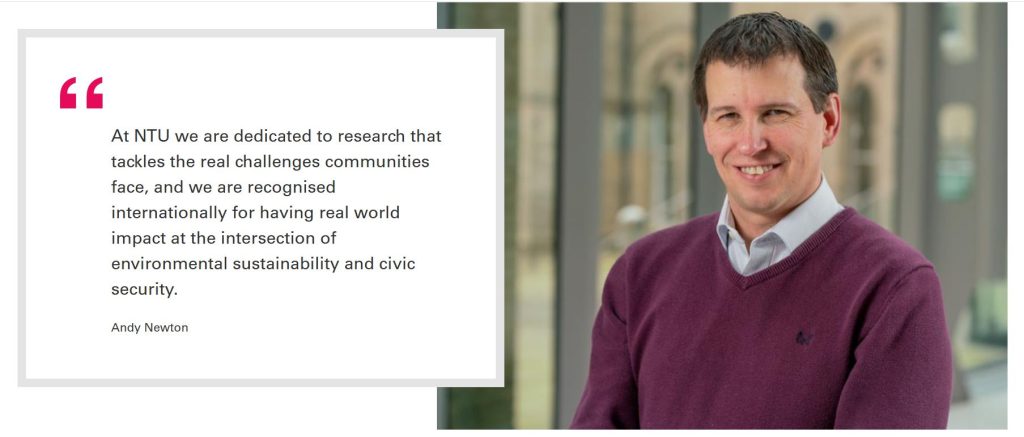Nottingham Trent University has been recognised as a Policing Academic Centre of Excellence (P-ACE) in a new initiative to ensure that policing is shaped by the latest and best scientific expertise.
The National Police Chiefs’ Council (NPPC) has created nine P-ACEs across the UK to drive collaboration among academia and policing, with NTU receiving £600,000 funding from NPCC, in partnership with UK Research and Innovation (UKRI).
The Centres will share and apply key insights and findings from their research in ways that directly support policing. They will also address the evidence needs and challenges raised by police forces, working in partnership to develop new research projects and knowledge-sharing activities.
Led by researchers across the University’s School of Social Sciences, School of Science and Technology, and Nottingham Law School, NTU-PACE brings together 15 policing, industry and community partners to translate research findings into actionable, transferable, and sustainable policy interventions, supporting the Home Office mission of ‘reducing harm, rebuilding confidence’.
NTU’s research combines expertise in safety, security, and sustainability to address key challenges that impact everyday life.
The University works to reduce crime such as burglary, anti-social behaviour, violence against women and girls, knife crime, shoplifting, and offences on public transport, by shaping both local and national policy.
NTU also focuses on strengthening public trust and fairness, tackling urgent issues like gender inequality, the impact of COVID-19, modern slavery, hate crime, and the effects of the digital world, with a strong commitment to protecting vulnerable and marginalised groups.
With an embedded scientist for the Climate Security National Foresight Group, its internationally recognised climate research will support NPCC to prepare for adverse weather, addressing climate-related risks, lowering carbon footprints, mitigation and adaptation, and cost-saving sustainability initiatives.
Furthermore, the University has a proven track record in surveillance and sensing, developing advanced tools for crime investigations, including novel sensors, forensic analysis, and intelligence-led policing.

Each Policing Academic Centre of Excellence will be promoted across the policing sector as an accessible source of leading academic experts aligned with Policing’s Areas of Research Interest (ARIs) and evidence needs. The P-ACEs will support policing with adopting new technologies, developing new tools and techniques, improving training and skills, and increasing public safety.
The project will be led at NTU by Andy Newton, Professor of Criminology and Policing at the School of Social Sciences, along with Professor Rowena Hill, School of Social Sciences, Professor Loretta Trickett, Nottingham Law School, and Associate Professor Rachel Bolton-King, School of Science and Technology.
Professor Newton said: “At NTU we are dedicated to research that tackles the real challenges communities face, and we are recognised internationally for having real world impact at the intersection of environmental sustainability and civic security.
“The P-ACE is supported though a seven-year research infrastructure prioritising institutional level interdisciplinary research, encompassing safety, security and sustainability. We will work with partners to translate these research findings into actionable, transferable and sustainable policy interventions.
“Being recognised by the NPCC as a P-ACE ensures our work directly informs policing practices, driving meaningful improvements in public safety and community wellbeing. This partnership strengthens our ability to turn research into real impact where it matters most.”
Professor Paul Taylor, Police Chief Scientific Adviser, said:“Academia and policing have a long history of collaborative working on issues as diverse as forensic science, crime prevention, and analytical technologies. The P-ACEs will fortify this connection, providing a focal point for research and knowledge exchange.
“I’m particularly excited about what the P-ACEs can bring to early career scientists who are interested in tackling the complex challenge of keeping the UK public safe. The P-ACE community will, I hope, provide them more opportunities and greater support as we look to forge deep and lasting partnerships over the next decade.”
Stian Westlake, Executive Chair of the Economic and Social Research Council (ESRC), said: “The Policing Academic Centres of Excellence will forge closer relationships between police forces and researchers, providing the police with data and evidence to make the justice system work better.
“By bringing experts in policing practice together with social scientists and data scientists across the country, the centres will provide knowledge and insights to drive service improvement. These centres of excellence demonstrate our commitment to reducing crime and making Britain a safer place.”
For detailed information about the expertise each P-ACE can offer visit science.police.uk
